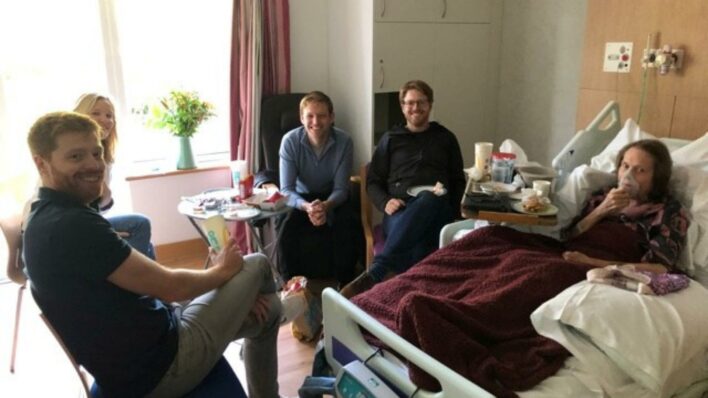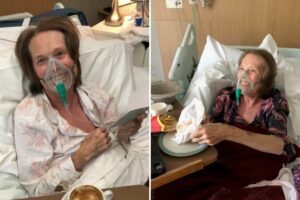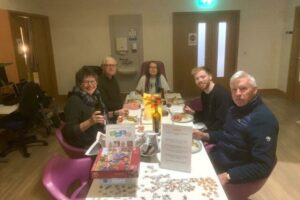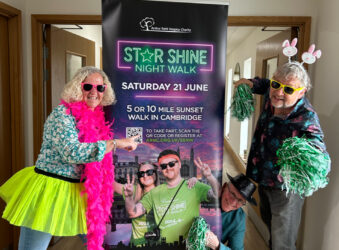Neil’s story
Share this story

Neil’s wife Judy received care from our Inpatient Unit team towards the end of 2021. He wrote a beautiful letter to us, explaining just how vital and special that care was to them and their family and has kindly given us permission to share an excerpt.
“I never knew what a magical place a hospice was until my wife Judy was admitted to the Arthur Rank Hospice on 12 October.
 At the start the Hospice was a place of grief, as we thought every goodbye would be the last and tears flowed down our cheeks. Then Judy’s condition stabilised. As days turned into weeks we established a routine, cycling up late morning with croissants from Maison Clément and ordering flat white coffees from the café. On Saturdays we started having the all-day breakfast together in her room. Our boys brought in their dogs. I was able to wheel round to the terrace area the electric bike that Judy wanted me to buy for Christmas. Everything was possible.
At the start the Hospice was a place of grief, as we thought every goodbye would be the last and tears flowed down our cheeks. Then Judy’s condition stabilised. As days turned into weeks we established a routine, cycling up late morning with croissants from Maison Clément and ordering flat white coffees from the café. On Saturdays we started having the all-day breakfast together in her room. Our boys brought in their dogs. I was able to wheel round to the terrace area the electric bike that Judy wanted me to buy for Christmas. Everything was possible.
Then Judy became more demanding of us. Hospice catering, excellent though it is, can never satisfy the desire of (rare) long-term residents for the taste of their familiar food and so it is not surprising that after a few weeks, Judy began to ask me to cook food at home and bring it in to eat with her. I did not attempt to do this every night, but I managed about three times a week. To begin with, we ate in her room but gradually we became bolder and with the encouragement of the staff, laid a table with electric candles in the communal area. Far from being made to feel we were trespassing on public areas, we were given the impression that everyone was glad to see the facility being used to the full.
 Last Tuesday, Judy and I had supper with two of our sons at that table and we had all the fun of a normal family gathering. At the end of the meal, I read a poem that our friend Alexander McCall Smith had just written for her in praise of her virtues. The following day she was so heavily sedated that by mid-morning, she lost any ability to communicate even by sign language. At 6.52pm, as I held her hand and stroked her hair, she died so imperceptibly that had I not been touching her, I might have missed the moment. The nurse who came in a few minutes later to confirm her death, brushed her hair and arranged her hands so that they held a flower taken from one of her vases. She spoke to Judy with such love that I wanted to hug her.
Last Tuesday, Judy and I had supper with two of our sons at that table and we had all the fun of a normal family gathering. At the end of the meal, I read a poem that our friend Alexander McCall Smith had just written for her in praise of her virtues. The following day she was so heavily sedated that by mid-morning, she lost any ability to communicate even by sign language. At 6.52pm, as I held her hand and stroked her hair, she died so imperceptibly that had I not been touching her, I might have missed the moment. The nurse who came in a few minutes later to confirm her death, brushed her hair and arranged her hands so that they held a flower taken from one of her vases. She spoke to Judy with such love that I wanted to hug her.
Throughout the last seven weeks, everyone at the hospice adapted naturally to our mood. They shared the happy times (which was most of the time) and they communicated empathy at the difficult times, often by a moist eye or tender gesture – more powerful by far than any plastic repetition of a formulaic phrase. I am in awe of them. Your staff are some of the loveliest people I have ever had the privilege of meeting.
Why do I narrate all this? Because I hope it shows from the experience of one grateful family how well the hospice accommodated our changing needs during the seven weeks that Judy was a patient. Everything we asked for was allowed, often with the suggestion we should go further. Nothing was permitted grudgingly; there was always enthusiasm.
All the good things I have described would be worth nothing if Judy had not been kept free from pain and had a peaceful death, but even that was managed to perfection. Her death came as a caress.
Please thank all the fine people who work at the hospice. What they do is extraordinary. For our family they have made a sad situation one we will remember with more happiness than we could ever have predicted.”
View other stories
-

Friends walk for Sherrall at Star Shine Night Walk 2025
A group of 18 friends from Royston walk in memory of Motor Neurone Disease Patient, Sherrall
-

Hospice supporter takes on Hyrox challenge in memory of his Coach
Ben Blowes will be taking on 31 Hyrox Challenges in 31 days
-

G Webb Haulage take to the skies for Arthur Rank Hospice Charity
Fifteen courageous members of the team raised an incredible £16,249 for the Charity
-

Cultural Beliefs observed by Hospice at Home Team
Ali passed away peacefully and pain free at home




